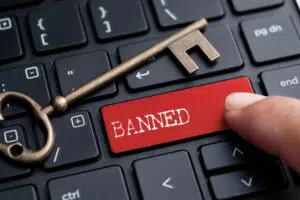
While they may be barred from holding directorial roles, their status as a shareholder is separate from their role as a director. Shareholders, regardless of their previous disqualification as a director, retain their ownership rights and interests in the company.
Disqualification as a director does not automatically revoke their shares or prevent them from holding shares in the company.
However, it is important to note that the disqualified director may face restrictions on their involvement in the management and decision-making processes of the company, depending on the specific legal provisions and agreements in place.
Being disqualified as a director may impact an individual’s rights as a shareholder. For example, a disqualified director may not be able to participate in the management or decision-making processes of the company, and may not have the same access to company information as other shareholders.
Can a banned director be a shareholder?
Yes, a banned director can still be a shareholder of a company. Being banned as a director typically occurs when an individual has been disqualified or restricted from holding directorial positions due to various reasons such as misconduct or failure to comply with legal obligations.
Here are just some of the other duties to consider:
- follow the company’s articles of association, setting out how the company is run, owned and governed
- keep company records up to date and to report any changes
- file company accounts and tax return
- inform shareholders if they might personally benefit from a transaction or arrangement the company makes
- pay Corporation Tax
Director disqualification regime applies to all directors.
A disqualification order not only prevents a person from being a director, but it also prevents them from being concerned with, or taking part in, the promotion, formation or management of a company. Accordingly, a disqualified director cannot simply resign as a director, have a family member or friend appointed in their place, or carry on running the company themselves.
As well as the prohibitions and restrictions under the CDDA, restrictions can arise under other statutes or rules of organisations.
Acting as a director while disqualified is a criminal offence, and may also make the individual concerned personally liable for company debts. An undischarged bankrupt is also automatically disqualified from being a director, and it is an offence for him to act as a director.
A director is not precisely defined in legislation but refers to all individuals who hold the position of director by whatever name called (section 250 Companies Act 2006). This includes:
i) De Facto Directors – directors who are held out as directors or perform functions which could only be carried out by a director, but who are not formally recorded as director in the Company’s statutory records and at Companies House;
ii) Shadow Directors – those individuals who whilst not openly acting as a director may instruct the company’s directors in the performance of their duties and the direction of the company. This is defined by Section 251 Companies Act 2006;
ii) Corporate Directors – i.e. companies who sit on the board of directors and are appointed as such;
iv) Directors of corporate directors;
v) Non-executive directors – whose responsibilities in respect of the management and direction of the company, including its financial affairs, are no different to that of appointed De Jure directors;
If shareholders act in any of the above ways it will be extremely difficult to distance themselves from any allegations of unfitness as a director in director disqualification proceedings. As such, all individuals involved in the management of a company must be aware of what their role is and whether it is conduct that could only be performed by a director. Otherwise it could be a director disqualification breach and lead to a penalty
Forming a new company as a disqualified director
When a new company is formed in the UK it must have at least one shareholder. During the registration process the initial shareholders in a company are called the ‘subscribers’. In the memorandum of association, the subscribers must agree that they ‘wish to form’ a company. It is this point that appears to be in conflict with the Company Directors Disqualification Act 1986.
What does the Companies Act 2006 say?
Section 8 of the Companies Act states-
8 – Memorandum of association
(1) A memorandum of association is a memorandum stating that the subscribers—
(a) wish to form a company under this Act, and
(b) agree to become members of the company and, in the case of a company that is to have a share capital, to take at least one share each.
(2) The memorandum must be in the prescribed form and must be authenticated by each subscriber.
Companies Limited by Shares will typically use the following statement in their memorandum of association-
“Each subscriber to this memorandum of association wishes to form a company under the Companies Act 2006 and agrees to become a member of the company and to take at least one share.”
Disqualified directors being Shareholders
The Company Directors Disqualification Act 1986 is quite clear that a disqualified director cannot form a company. Yet the subsequent Companies Act 2006 requires subscribing shareholders to agree to ‘form’ a company. Unfortunately this creates a ‘grey area’ that has several unanswered questions-
- Should a disqualified director be allowed to be a shareholders if they are seen to be ‘forming’ a company?
- If the company is registered by a non-disqualified person and the shares are transferred afterwards to a person that is disqualified from being a director, is this OK? As the disqualified director did not actually ‘form’ the company, is the conflict between the laws removed?
- If section 8(a) of the Companies Act 2006 was removed or had been written differently there would be no conflict with the Company Directors Disqualification Act 1986. However, could a person be seen to be ‘running’ a company if they are the sole shareholder with someone else appointed as a director?
Read more: Can a Disqualified Director operate as a Sole Trader?
Leave to act while disqualified
It is possible to apply to the court for leave to act as a director, or take part in the management of the company while disqualified. Leave is essential if a disqualified director is to avoid committing a criminal offence. However, no guidance is given in the CDDA, and the matter is very much at the court’s discretion.
Conclusion
In conclusion, a disqualified director can still be a shareholder in a company. However, they may be prohibited from participating in the management or decision-making of the company, and may be required to divest themselves of their shares if they are unable to comply with their disqualification orders.
It is important for directors to be aware of their legal obligations and to ensure that they do not engage in any activities that may result in their disqualification. This is especially important for directors who also hold a significant shareholding in the company, as their disqualification could have significant financial consequences.
David is a Solicitor and Chartered Tax Advisor. David has many years experience of advising clients on Regulatory Fraud matters, involving the smallest to the very biggest cases.
He regularly lectures to the City of London Police on these and related issues. He regularly advises on Confiscation and other consequences that flow from money laundering offences
